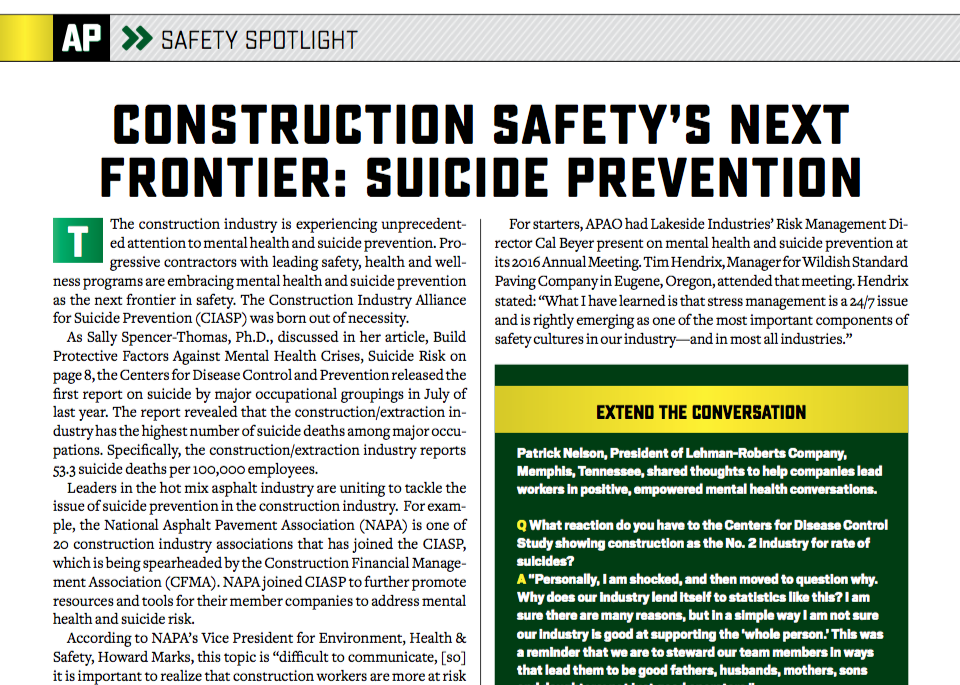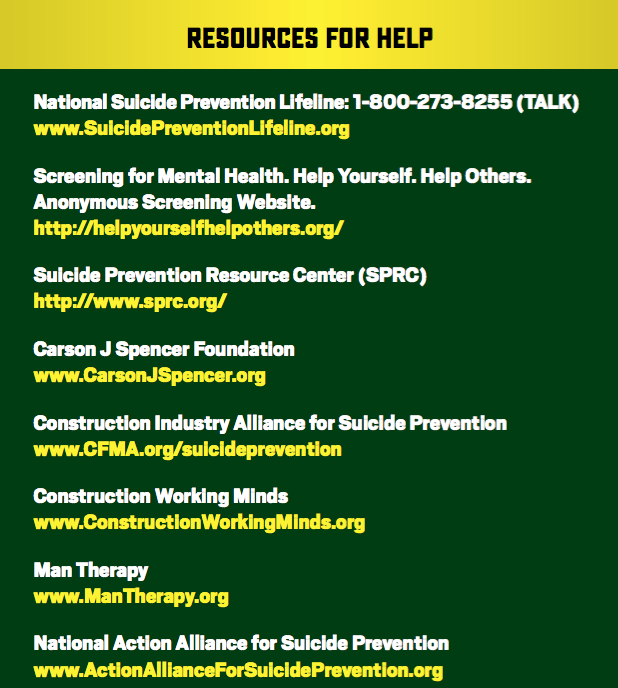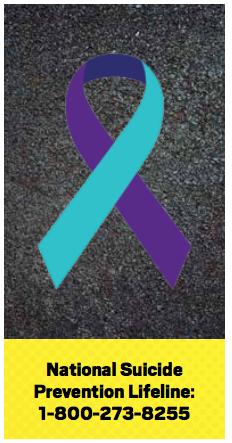Construction Safety’s Next Frontier: Suicide Prevention
BY Cal Beyer

The construction industry is experiencing unprecedented attention to mental health and suicide prevention. Progressive contractors with leading safety, health and wellness programs are embracing mental health and suicide prevention as the next frontier in safety. The Construction Industry Alliance for Suicide Prevention (CIASP) was born out of necessity.
As Sally Spencer-Thomas, Ph.D., discussed in her article, Build Protective Factors Against Mental Health Crises, Suicide Risk on page xx, the Centers for Disease Control and Prevention released the first report on suicide by major occupational groupings in July of last year. The report revealed that the construction/extraction industry has the highest number of suicide deaths among major occupations. Specifically, the construction/extraction industry reports 53.3 suicide deaths per 100,000 employees.
Leaders in the hot mix asphalt industry are uniting to tackle the issue of suicide prevention in the construction industry. For example, the National Asphalt Pavement Association (NAPA) is one of 20 construction industry associations that has joined the CIASP, which is being spearheaded by the Construction Financial Management Association (CFMA). NAPA joined CIASP to further promote resources and tools for their member companies to address mental health and suicide risk.

According to NAPA’s Vice President for Environment, Health & Safety, Howard Marks, this topic is “difficult to communicate, [so] it is important to realize that construction workers are more at risk for suicide. CFMA through the CIASP does a great job at getting the message out and detailing ways that can help construction industry workers get the kind of assistance that can address the root cause of suicidal thoughts.”
John Hickey, Executive Director of the Asphalt Pavement Association of Oregon (APAO), attended a regional suicide prevention summit that CFMA sponsored in November 2016. Hickey “was shocked to learn that construction has the second highest suicide rate among all industries, and is first if architecture and engineering is included in construction.” Hickey continued: “Although our industry has made great strides in promoting safety, it has not focused on mental health [and doing so] will improve safety and productivity. We need to do more. The asphalt pavement industry in Oregon will start dedicating time to mental health in our trainings for superintendents and new crew members.”
For starters, APAO had Lakeside Industries’ Risk Management Director Cal Beyer present on mental health and suicide prevention at its 2016 Annual Meeting. Tim Hendrix, Manager for Wildish Standard Paving Company in Eugene, Oregon, attended that meeting. Hendrix stated: “What I have learned is that stress management is a 24/7 issue and is rightly emerging as one of the most important components of safety cultures in our industry—and in most all industries.”
Charlie Gallagher, President of Gallagher Asphalt Corporation in Thornton, Illinois, supports this position as well. Gallagher asserts, “our employees’ mental health is just as important to us as their physical health. Being of assistance in whichever way we can to keep our folks mentally healthy can truly be life-saving, and generating further awareness of suicide prevention is a message Gallagher Asphalt firmly supports.”
 Peter Wilson, President and CEO of Barriere Construction in Metairie, Louisiana, offered his agreement with these other asphalt industry leaders. Wilson expressed that “Barriere’s employees are the lifeblood of our business, and our safety and wellness programs are designed to address all aspects of their health and well-being, both physical and mental.” Wilson continued, “Offering proper clinical resources is only a piece of the equation, though, and we aim to provide them with a support system while at work and embody a true culture of care. We believe that we can accomplish this by living our core values daily and ultimately building the trust necessary to ask for guidance and help when needed.”
Peter Wilson, President and CEO of Barriere Construction in Metairie, Louisiana, offered his agreement with these other asphalt industry leaders. Wilson expressed that “Barriere’s employees are the lifeblood of our business, and our safety and wellness programs are designed to address all aspects of their health and well-being, both physical and mental.” Wilson continued, “Offering proper clinical resources is only a piece of the equation, though, and we aim to provide them with a support system while at work and embody a true culture of care. We believe that we can accomplish this by living our core values daily and ultimately building the trust necessary to ask for guidance and help when needed.”
Barnhill Contracting Company in Rocky Mount, North Carolina, has a unique program that aligns with its company’s values of building a caring culture. Jimmie Hughes, Vice President of Human Resources/Safety, described how Barnhill has been working with Corporate Chaplains of America for a full year. “Beyond the company saying that we sincerely care about our employees and their families we are now showing that we care,” Hughes shared. “Employees have embraced the Chaplains’ presence in the workplace, the hospital room, and the funeral home. A chaplain is always there to ask ‘how can I help you today?’ This is especially helpful for those employees that do not have family or friends to lean on. They now have a chaplain to call on when in need and they are always available 24/7.” Hughes asserted this program has been an enhancement to Barnhill’s employee assistance program (EAP) and believes Corporate Chaplains of America would enhance any suicide prevention program.
These comments by industry leaders reflect the growing awareness of mental health and suicide prevention in the asphalt industry. David James of FNF Inc. in Tempe, Arizona, offered pointers for initiating a company’s cultural shift. “First steps should be directed towards education, awareness and beginning the dialogue,” he said. Those steps should include:
- Hanging posters around the office and jobsites that describe warning signs and offer resource information;
- Incorporating the topic in company newsletter articles to address support and care for workers;
- Addressing the topic in office and field meetings (such as safety meetings and tool box talks);
- Discussing at board or other leadership meetings to develop an action plan;
- Communicating a top-down management message to encourage open dialogue and reduce fear of reprisal;
- Providing easy access to resources both internal and external to the company;
- Establishing and promoting an Employee Assistance Program (EAP);
- Thinking outside the box for worker resources; and
- Initiating comprehensive wellness plans for employees.
Extend the Conversation
Patrick Nelson, President of Lehman-Roberts Company, Memphis, Tennessee, shared thoughts to help companies lead workers in positive, empowered mental health conversations.
Q: What reaction do you have to the Centers for Disease Control Study showing construction as the No. 2 industry for rate of suicides?
A: “Personally, I am shocked, and then moved to question why. Why does our industry lend itself to statistics like this? I am sure there are many reasons, but in a simple way I am not sure our industry is good at supporting the ‘whole person.’ This was a reminder that we are to steward our team members in ways that lead them to be good fathers, husbands, mothers, sons and daughters; not just good operators.”
Q: What challenges/obstacles will your company encounter in addressing this topic of mental health and suicide prevention?
A: “There is a macho attitude in our industry that resists help. I have seen this attitude diminish in my career but it is in small and large ways still very much alive. We need to move past the uncomfortable and lean into areas that help the ‘whole person’ remain healthy in all areas of their lives.”
Q: Does your company have an Employee Assistance Program? Do you know what your utilization rate is?
A: “We do have an EAP and the utilization has been up and down. However, we have seen some great stories in the area of financial counseling that have been beneficial to several families.”
Q: What reaction do you have to suicide prevention as the “next frontier in safety?”
A: “As leaders in this industry we have a responsibility to look at all areas of risk for our team members and for our businesses. With this information we would be neglecting that responsibility to not begin to speak about this risk in significant and meaningful ways.”
 Cal Beyer is the Risk Management Director for Lakeside Industries, a hot mix asphalt production and paving contractor in Issaquah, Washington. He serves on the executive committee for the National Action Alliance for Suicide Prevention and as the co-lead of its Workplace Task Force. Since 2015 Beyer has been co-leading an initiative in the construction industry on mental health and suicide prevention with Sally Spencer-Thomas, Ph.D., of the Carson J Spencer Foundation in Denver. He spoke at the 2016 and 2017 NAPA annual meetings and also at the 2016 and 2017 Washington and Oregon Asphalt Pavement Association meetings.
Cal Beyer is the Risk Management Director for Lakeside Industries, a hot mix asphalt production and paving contractor in Issaquah, Washington. He serves on the executive committee for the National Action Alliance for Suicide Prevention and as the co-lead of its Workplace Task Force. Since 2015 Beyer has been co-leading an initiative in the construction industry on mental health and suicide prevention with Sally Spencer-Thomas, Ph.D., of the Carson J Spencer Foundation in Denver. He spoke at the 2016 and 2017 NAPA annual meetings and also at the 2016 and 2017 Washington and Oregon Asphalt Pavement Association meetings.
